‘I wanted to be in charge’: The FDA’s women leaders
In 1958, the Council of Women Civil Servants dissolved itself, believing its objectives were met. For International Women’s Day, the FDA’s six surviving female Presidents discuss the challenges still facing women in senior roles and reflect on their time leading the union.
*This article has been updated to reflect Presidents who have served since the original publication.
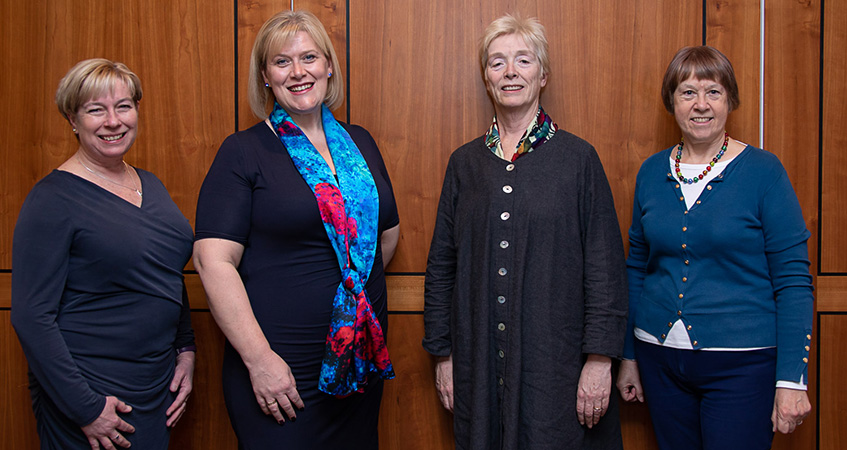
What barriers did you face in your career or in becoming President of the FDA?
Alex Brett-Holt (President 1987-89): When I was becoming a barrister in the 1970s, people would say to me quite frankly, “we don’t take women in these chambers”. That put me off the Bar as a career. I just thought, I’ve got better things to do than educate these silly little public schoolboys. When I joined the civil service, I was gobsmacked to discover there had been separate pay scales for women as recently as the 1960s. I suddenly realised that some of the women I was working with had actually gone through that system and were pretty livid to see people saying there was no problem now. There were still vestiges of those attitudes, even in the union. At the FDA conference in ’77 or ’78, I remember being told very tartly that there was no point in setting up an organisation for women because we were only 10% of the membership. The idea of a goal of actually increasing it from 10% was completely off limits. Even as Chairman [the title was changed to President in 1988], I remember going to meetings… when people would try to work out whether I was somebody’s secretary, and watching them tie themselves in knots trying to ask that question was quite funny.”
Fiona Eadie (FDA President since 2018): Those attitudes haven’t completely gone away. I recently represented the union at a meeting in Israel. The Vice President introduced himself and I introduced myself as President, then I heard it interpreted as that I was just there with him. There was an assumption that he was the senior one and I was there just to support him.
Frances Pickering (FDA President 1993-95): When I became President of the AIT [the FDA’s Inland Revenue section at the time] a few years before the FDA, it caused horror and consternation amongst a wide swathe of senior management and senior people in the union that a woman was going to be President of the AIT – the most macho organisation there was. It took them quite a long time to come round to it. Some men in the pay section actually refused to take my phone calls on the grounds that I was a woman. Battles were fought in getting to the top of AIT but, after that, the FDA was somewhat easier.
Sue Jarvis (FDA President 1999-2001): When I became President, I was a single parent with three children at school. I remember my phone going off while Mo Mowlam [Northern Ireland secretary in Tony Blair’s Government] was speaking at a meeting I was chairing. Initially, I was really embarrassed, but afterwards I thought, this is the deal, it’s one of the things that women in those circumstances have to do and it’s not the end of the world. I spoke to Mo afterwards and she was fine. So, I think the biggest challenge for women isn’t the juggling – we get pretty used to plate spinning and all that – it’s that you don’t want other people to see you as a half professional person. When I went back to work after my third child, everyone had suddenly got a desktop computer and everything had changed. It was like going time travelling: I had gone home from one civil service and came back to another. And I was also desperate to prove myself, of course. It’s difficult for women who might have to adapt like that several times in their careers.
Vicky Johnson (FDA President 2020-22): My career started in Inland Revenue in 1986 so the first hurdle I faced was computerisation and the second was the attitude of the Management Inspector who thought it was acceptable to tell me that he’d have kicked me out in six months if he was married to me. I had experienced misogyny in my first job at a Stockbrokers so I was able to control my response, though I did tell him it was a big assumption that I’d have married him in the first place. When I decided I would like to try and lead ARC [the FDA’s HMRC section], which I did two years before leading the FDA, my mother asked me if I was going to be President of the ‘Ladies Section’. I suppose it’s a generational thing with Mum, but it does show that the attitudes from the 1980s are still not quite gone.
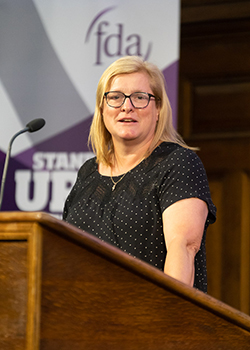
What was your biggest challenge or proudest moment as FDA President?
Alex Brett-Holt: I think getting a more than adequate General Secretary in place after John Ward left in 1988. I found myself having to do things I’d never done before, literally trying to drum up a respectable field with no support in the office because other staff had left or had their hats in the ring. And I was trying to deal with two children under five and a busy job. It was quite a challenge, but I was very pleased that we eventually got Liz Symons.
Sue Jarvis: I saw my job as bringing the Executive Committee (EC) and General Secretary together around a common vision. Jonathan [Baume, General Secretary 1997-2012] was clear quite early on that the FDA wasn’t sustainable as it was; the senior civil service was getting smaller and we were a very small union that needed to look more widely. So, I guess my proudest moment was taking us through really complicated negotiations with Unison to establish Managers in Partnership (MiP) for members in the NHS.
Sue Gethin (FDA President 2013-15): One of the things I’m really proud of is the FDA’s Women into Leadership conferences, because I was right there at the beginning setting it up with [former FDA National Officer] Ro Marsh. It’s been a phenomenal achievement for the union. We had about 150 people at the first one, and last year there were 2,500 all around the country. It’s really good that so many departments bought into this and to see all the Permanent Secretaries come along to speak and support it.
Fiona Eadie: By far and away the thing that I enjoy most as President is going to chair those conferences – they’re so motivating, inspiring, interesting and positive.
Vicky Johnson: My presidency was dominated by the pandemic and I’m proud of how the FDA was able to adapt during this time and continue delivering, from keeping our members safe, to improving our online FDA Learn offer. My proudest moment was chairing the first Annual Delegate Conference after lockdown. The feeling as I sat on the stage looking out at the auditorium filled with members and then as I walked back to the hotel at the end of the day, knowing I had steered us through some quite thorny debates but delegates had acted professionally throughout, will stay with me right up with the highlights of quite a long career.
What lessons did you take away from your time as President? Did it help your career?
Sue Jarvis: I learned to focus on finding common ground. You tend to get very strong personalities in trade unions, in the FDA as anywhere else. EC members are often big characters and not afraid to behave as big characters. I think women are really good at finding other ways of resolving things than just deciding who’s right and who’s wrong. It’s about giving people space and getting them to respond positively to the other side of the argument.
Frances Pickering: I felt I had respect, and when I spoke people shut up and listened because I’d done two years as AIT President and everybody knew what that meant. In career terms, I didn’t get any favours, but I did feel that I could get my views listened to, and that was quite an important thing.
Sue Gethin: I don’t think it’s helped or hindered my career directly, but I did acquire skills to take back to my day job, because I had a very steep learning curve as I went up through the union. I don’t think I realised what a politician you have to become, or what an innate politician you already are, even if you don’t realise it.
Sue Jarvis: When I took early retirement a few years later, my status in the trade union movement was recognised and, as a direct result, I ended up getting three fantastic jobs – with the employment tribunal, the Civil Service Appeal Board and the security vetting panel. I definitely missed out on some career experience in the Home Office but, on the other hand, I was on first-name terms with the Permanent Secretary and I was aware of things going on in the department that I wouldn’t have known about as a straightforward Grade 6.
Vicky Johnson: I learnt to do what you say you are going to do, or explain why you cannot. You can offer support and advice if asked, but you should never push into situations. Don’t be afraid to say you disagree with someone, but remain polite and courteous. If you do all those things, people will come to you and follow your lead.
What advice would you give to young women aspiring to leadership positions in the civil service or the FDA?
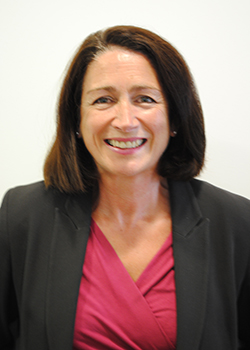
Sue Gethin: Believe in yourself and what you can do. Have confidence in your own ability. Listen, learn and interact. There’s that hashtag, #thisgirlcan, that goes around a lot. And that’s just it: you can do it, and don’t let anybody tell you that you can’t.
Sue Jarvis: Yes, the best advice is that you can do it in your own way. But I’m not sure that’s different for women and men. When I joined the civil service in 1976, it was still run by men in tweed jackets who spoke Latin, and that wasn’t my life or my personality. Around the mid-80s, all that changed – it was definitely a good time to be a confident, freethinking, pragmatic, decision-making civil servant. The biggest thing that drove me to become a leader was that I didn’t want some other idiot doing it. You look at the competition and you think, well, they’re not going to do it right, so why don’t I do it? Using your personality to do your job in your own way is the best way to be successful and enjoy yourself.
Frances Pickering: Before I started work, my mother told me two things: never learn to type because you’ll be a secretary all your life, and join the union on your first day – and that advice has always stood me in good stead. I actually wanted to be in charge. When I joined the Revenue, they promised you would be in charge of your own tax district at 30, and I was. Then, when I got involved in the union, I wanted to be in charge. I didn’t want to be the person who helped, I wanted to be the person who said what happened.
Alex Brett-Holt: Maybe I’m a bit of a lightweight, but I just did what I enjoyed doing. I found the FDA, and the issues they were dealing with, an enjoyable area. I find something chilling about ‘embracing my leadership potential’. I never saw it like that. I didn’t particularly want to lead, I just wanted to do this fun stuff.
Fiona Eadie: I heard an interesting talk at the Women into Leadership conference about the history of women in the civil service, about the marriage bar, Evelyn Sharp, an FDA member and the first woman to be a Permanent Secretary and whathave-you. But there was also a report from the 1940s, which quoted the Treasury saying that married women in the civil service had been “a perfect nuisance”. I quite like the idea of being a nuisance, but I really like the idea of being a perfect nuisance, so I think that’s a good takeaway from this: be a perfect nuisance.
Vicky Johnson: Never let anyone tell you that you cannot do something. You might do it differently from how you first thought but don’t let someone’s negativity put you off. Be yourself and remain loyal to those who have supported you. Remember that family is important at all times and however much you are enjoying what you are doing, they must come first.
Related News
-
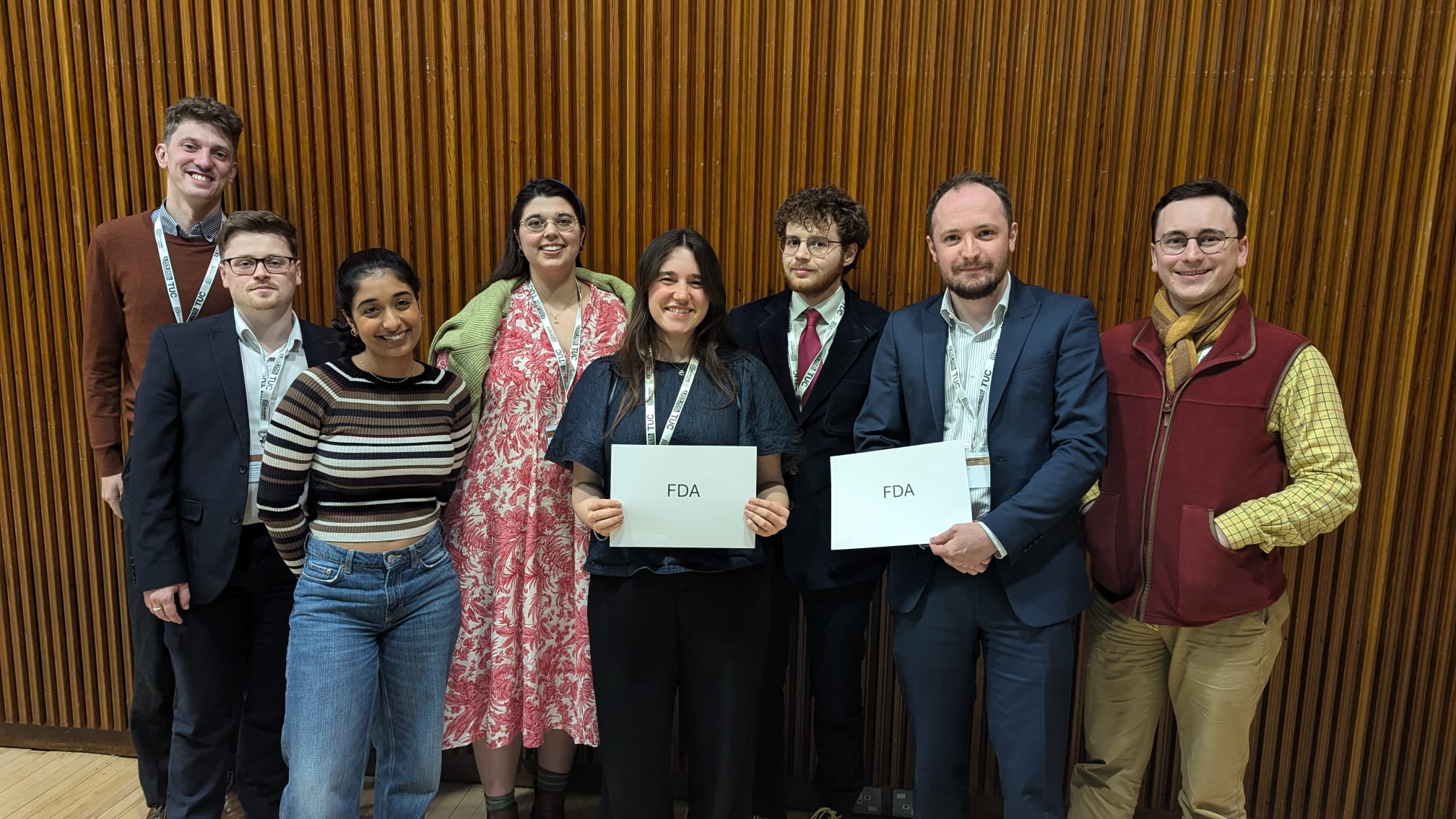
FDA attends TUC Young Workers’ 2025
This March, an FDA delegation attended the annual TUC Young Workers’ Conference in Congress House, London.
-
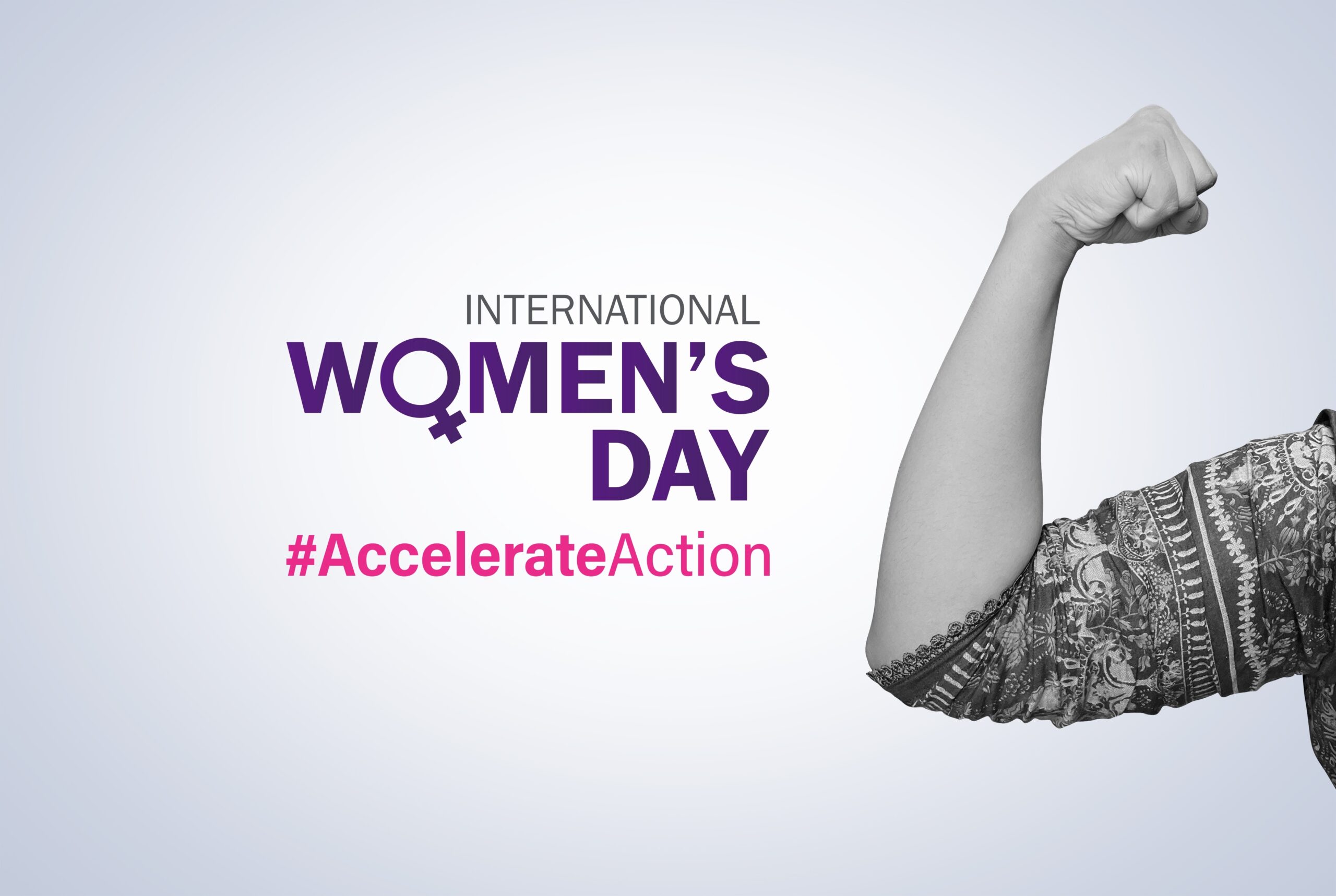
FDA celebrates Women’s History Month 2025 with panel event
To celebrate Women’s History Month and International Women’s Day 2025 the FDA hosted a panel event looking at the history of women in the civil service and within the trade union movement.
-
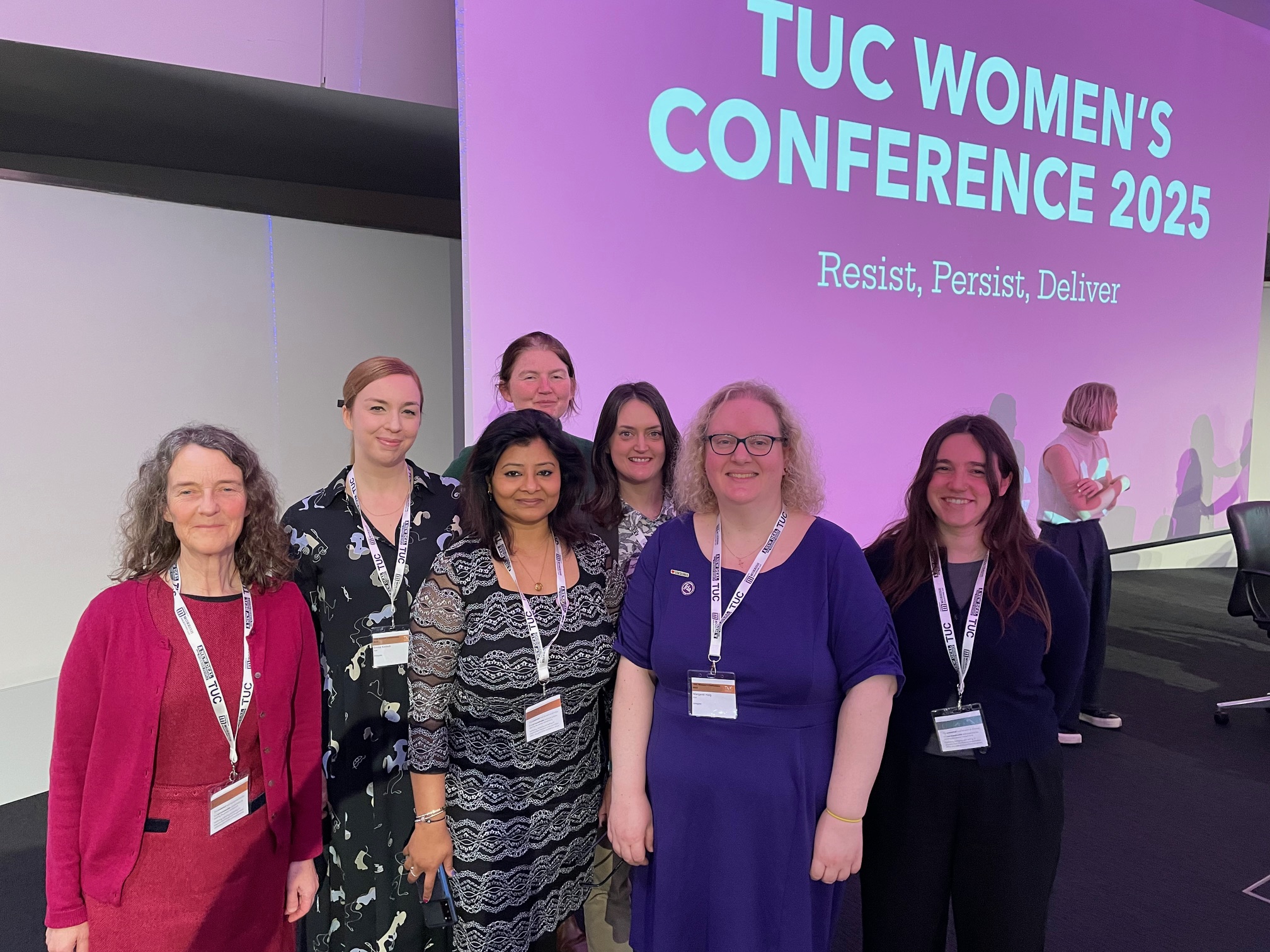
FDA attends TUC Women’s Conference 2025
A delegation of FDA members attended TUC Women’s Conference 2025, held in Congress House, London, from 5-7 March.